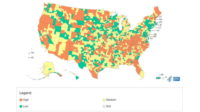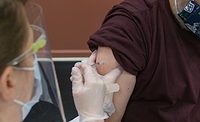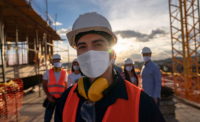New CDC Guidelines Frees Vaccinated Roofing Contractors from Masks, Social Distancing

Roofing contractors who are fully vaccinated no longer have to wear masks or practice physical distancing for nearly all activities, according to the Centers for Disease Control and Prevention (CDC).
The CDC updated its guidelines on May 13, just over two weeks after it relaxed some prevention measures for people who are fully vaccinated against COVID-19. People are considered fully vaccinated two weeks after receiving the second dose of a Pfizer or Moderna vaccine or one dose of the Johnson & Johnson vaccine.
“Anyone who is fully vaccinated can participate in indoor and outdoor activities, large or small, without wearing a mask or physical distancing,” said CDC Director Rochelle Walensky. “We have all longed for this moment when we can get back to some sense of normalcy.”
In other words, it’s safe for roofing contractors who are fully vaccinated to not wear masks or stay 6 feet apart in instances such as:
- Working indoors or outdoors
- Traveling together in the same vehicle to jobsites
- Eating a meal at a restaurant
- Attending roofing industry events and expos (unless the venue/state requires masks — see below)
“Today is a great day for America and our long battle with the coronavirus,” said President Joe Biden on May 13.
There are some caveats — people still need to wear masks and stay 6 feet apart when visiting doctors, hospitals, or long-term care facilities like nursing homes. These preventative measures also need to be taken on public transportation and in places like airports and bus stations.
The CDC is also deferring to local, state, tribal and federal laws, rules and regulations when it comes to wearing masks or social distancing. For example, a business may still require people to wear masks when in their facilities. According to NPR, many state and city officials welcomed the CDC’s announcement, but some are not implementing the changes right away. Some states, including South Carolina and Texas, previously lifted mask mandates, while states like California and New York aren’t immediately taking up the new guidelines.

The new recommendations are based on the latest scientific studies showing the effectiveness of the COVID vaccines, including one from Israel published in the Journal of the American Medical Association that shows the vaccine is 97% effective against symptomatic COVID-19 and 86% effective against asymptomatic infection in over 5,000 health care workers.
Vaccine Hesitancy Strong Among Construction Workers
The new guidelines apply to those who are fully vaccinated, whereas people who haven’t completed their vaccine doses or didn’t receive a vaccine should wear masks and stay 6 feet apart to protect themselves and others from getting sick.
Construction workers are a mixed bag when it comes to getting the vaccine. A recent survey shows that those in the construction industry are among the most hesitant to receive a COVID vaccine, with 46.4% of respondents saying they “probably” or “definitely” won’t get it. They report a lack of trust in the COVID-19 vaccine and the government, disbelief about the need for the vaccine, and dislike of vaccines in general for their hesitation.
As of today, only 36.3% of Americans have been fully vaccinated, and 47.1% have received at least one dose. In order to obtain herd immunity — which will help prevent the spread of COVID — experts have projected anywhere from 70 to 90% of the population needs COVID immunity.
For workers considering getting the vaccine, their employers can apply for tax credits funded by the American Rescue Plan that provides full pay for employees who take time off to get and recover from a COVID-19 vaccination.
The CDC’s announcement falls in line with predictions made by Trent Cotney, CEO of Cotney Attorneys & Consultants, who in late April said that contractors can expect to see more benefits as the vaccine rollout continues.
“It’s going to be the kind of thing where, if you’re not getting vaccinated, you’re going to be in a bad position because you’re probably still going to have to wear a mask, you’re still going to have to do a lot of these things that need to be done,” Cotney said.

Looking for a reprint of this article?
From high-res PDFs to custom plaques, order your copy today!






